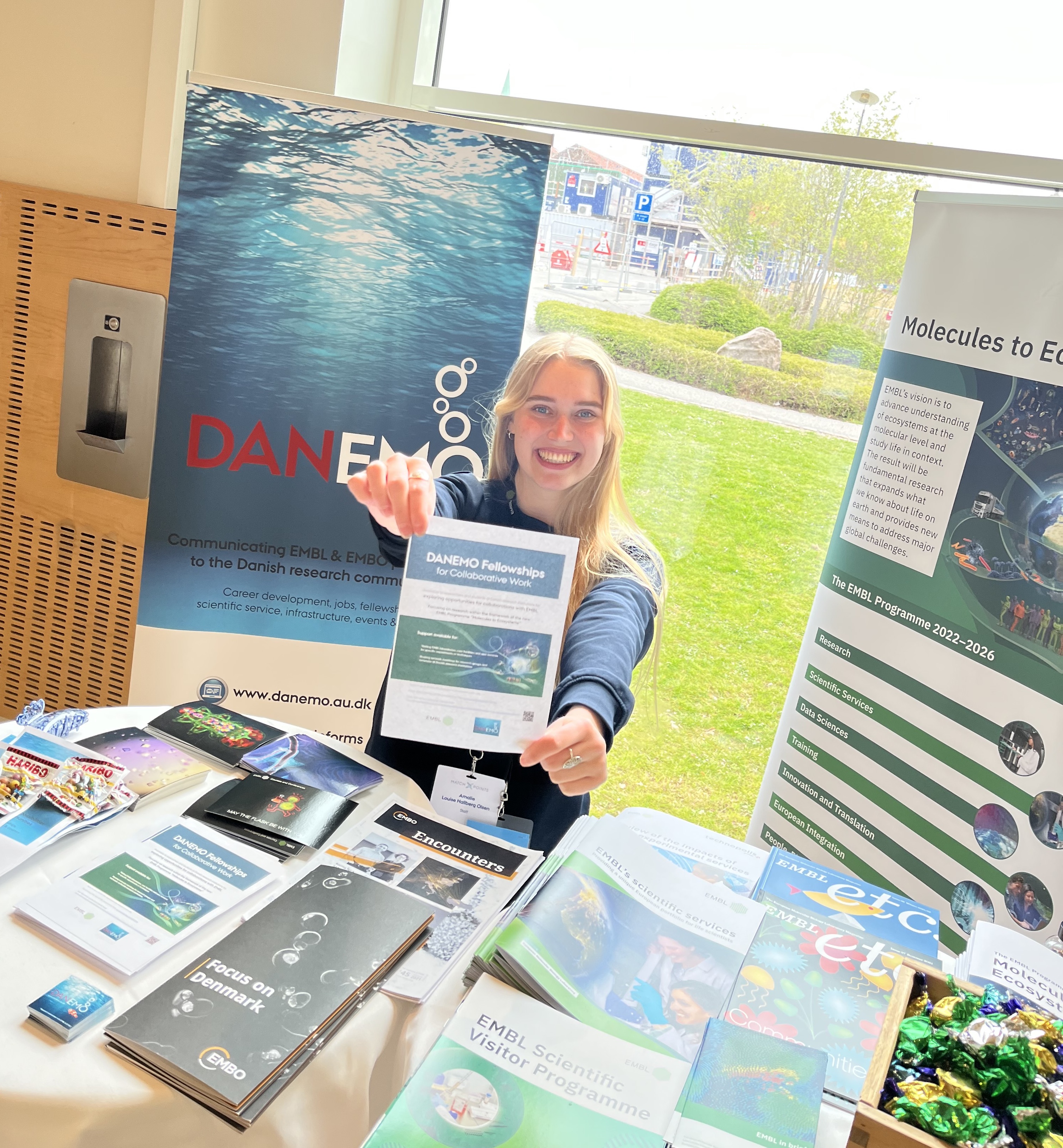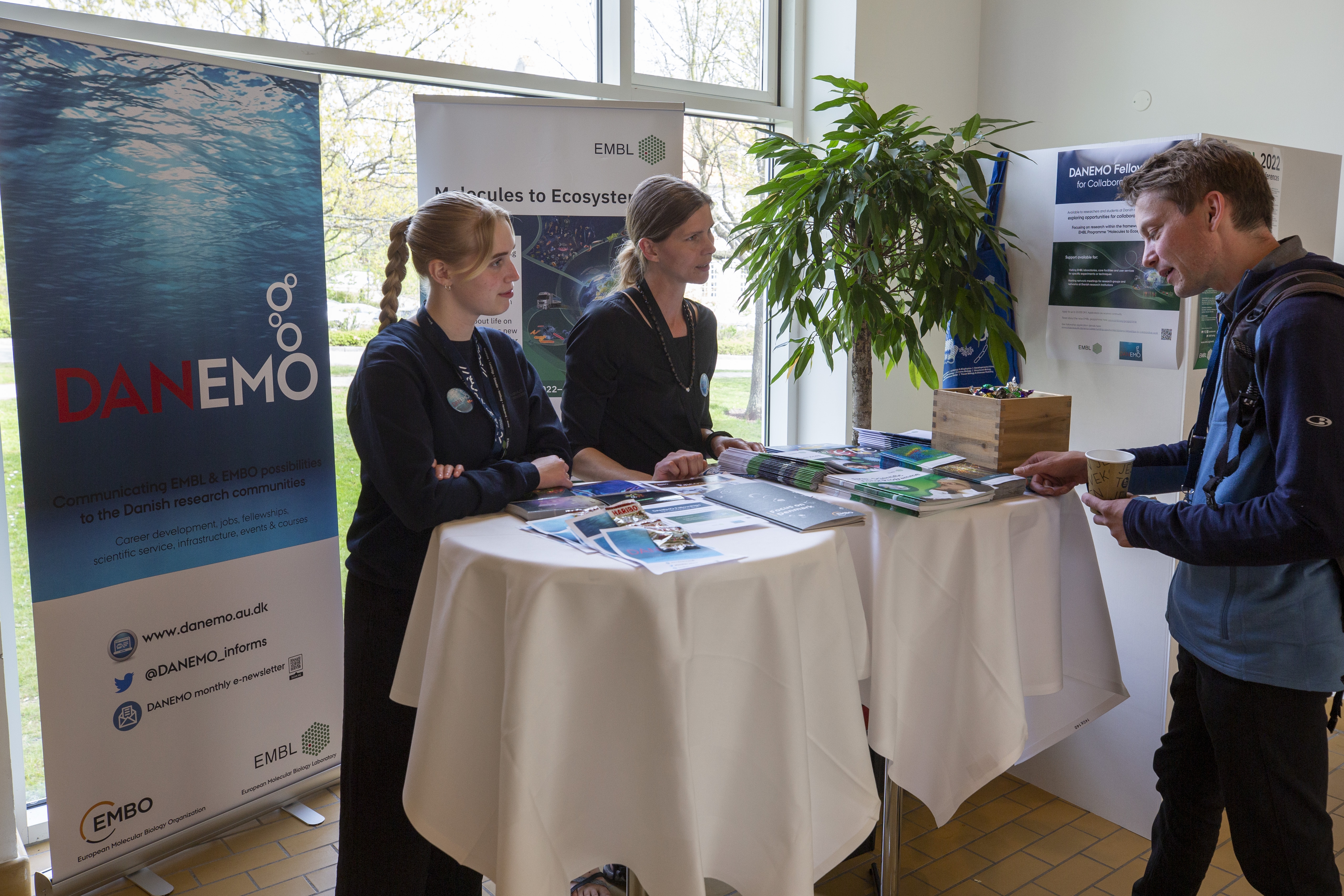DANEMO one year on: raising awareness in Denmark about EMBL and EMBO opportunities
An interview with the current DANEMO communications coordinator Karen Bech-Pedersen and administrative program coordinator Maria Thykær Jensen at the Danish Research Institute of Translational Neuroscience, DANDRITE, about the first year accomplishments and future outlook of DANEMO.


DANEMO is a communication platform and research support initiative with the aim to draw the attention of scientists and students in Denmark to the numerous opportunities at EMBL and EMBO. Supported by the Danish Ministry of Higher Education and Sciences, DANEMO launched in April 2021 and is currently hosted by DANDRITE at Aarhus University.
What are you hoping to accomplish with DANEMO?
We have three main aims in DANEMO. We want to 1) raise the awareness of EMBL and EMBO funding schemes, 2) stimulate collaborations with EMBL research groups, and 3) promote the use of EMBL’s Scientific Services and core facilities for research. These aims developed as a result of a desire, of the Ministry, for scientists in Denmark to garner all the possibilities that Danish EMBL membership provides. With DANEMO, we want to reach across Denmark to all scientists and students working at all Danish academic institutions and industry.
What were DANEMO’s most significant actions and accomplishments in the first year?
It's been a busy first year setting up the project. It's not all done in one year, but we are on a good wave.
DANEMO is first and foremost a communication platform, and we needed to figure out the best ways to reach scientists and students all across Denmark. We have developed regular communication channels of a website, monthly newsletter, and social media. Through these channels we spread news and opportunities from EMBL and EMBO on a nearly daily basis.
A key part of the communication work has been developing a big and wide network of communicators that can help us to reach scientists and students and grow our subscriber and follower lists. When we receive new material from EMBL we share it forward to the network. We get quite nice feedback that they really want to be informed and appreciate getting the information.
A big boost to our objectives came through an event we held with EMBL in December 2021 at the Technical University of Denmark (DTU) in Copenhagen – EMBL in Denmark 2021: Enzymes of the future. This two-day scientific and alumni event featured talks on enzymes, structural enzymology, and translation of discoveries in enzymology. EMBL’s scientific services, training opportunities, alumni and careers were also on display. We were happy to be able to provide travel awards for this event.
Further, we just launched the DANEMO Fellowships for Collaborative Work. These are fellowships specially designed to stimulate and help establish new contacts of scientists in Denmark with EMBL research groups and scientific services. These fellowships have a special focus on the research areas in EMBL’s new scientific program for 2022-2026 "Molecules to Ecosystems". This came as a strategic initiative at the beginning of 2022, combined with the launch of the new EMBL program and creating a specific opportunity for relevant research areas.
We also just completed our first annual report and recruited a student assistant who is highly skilled in social media.
What challenges have emerged in the first year?
It is challenging to figure out the best ways to reach specific users. We are learning the pros and cons of targeted and open announcements. And, we are learning that we really need to directly approach various departments and event organizers at all universities, asking them if we could have 5-10 minutes to present DANEMO. For example, we will be attending some of our local, big research meetings, such as Matchpoints at Aarhus University in May 2022. And, in local departmental annual meetings, we are aiming to present a poster on DANEMO. In our Steering Committee we are working to identify the relevant events and meetings.
Another challenge is figuring out how to best reach industry. We currently have contacts at the Confederation of Danish Industry, and that’s a great start. They have an annual meeting in May. We are hoping to meet representatives there from many different companies.
What can we expect from DANEMO in the coming year?
One of our most exciting initiatives for 2022 is the DANEMO symposium in November 2022 in Aarhus. The date will soon be set, and the scientific program is under development.
Communication-wise, we would like to approach the university newspapers to help us spread the word about DANEMO. And, we may begin to interview some of the scientists who have used EMBL facilities or been awarded fellowships.
Let’s end by going back to the beginning for our readers. How did DANEMO get started and how is it organized?
DANEMO is the outcome of a recent large-scale survey, by the Danish Ministry of Higher Education and Science, on how scientists in Denmark interact with EMBL and EMBO. With the survey data, the Ministry determined that the resources at EMBL and EMBO are important for Danish science, that opportunities provided by EMBL and EMBO could be utilized more, and that raising awareness was the most important and urgent step to take.
As a result, DANEMO was constructed with a Steering Committee currently led by DANDRITE Director Prof. Poul Nissen (EMBO member). The Steering Committee meets every two to three months and includes representatives from all major Danish higher education institutions, including EMBL Council Member Prof. Kaare Teilum at the University of Copenhagen.
Funding for DANEMO covers events and activities, communication, strategic collaborative fellowships, a student assistant and partial salary support for the communications and administrative program coordinators. Coordination rotates among Danish universities every two years.
Based on our interactions in the first year, it is clear that DANEMO has gotten attention in other countries. A proliferation of the model or a similar approach to raise awareness for scientists and students nationally would certainly be an added, and fortuitous, outcome of DANEMO’s efforts.